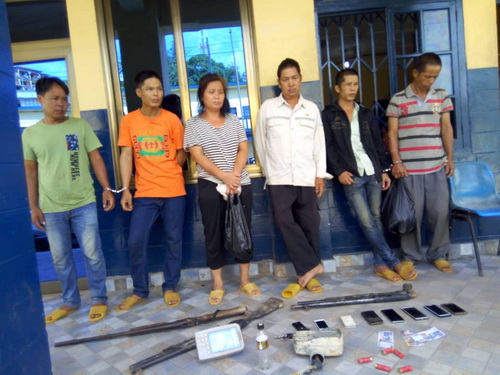Population Council To Prioritise Education On Child Marriage
- Home
- Population Council To Prioritise Education On Child Marriage

Population Council To Prioritise Education On Child Marriage
 Teenage pregnancy prevalence in the country is estimated at 17.8 per cent and child marriage at 23.6 per cent, according to the World Bank’s collection of development indicators, 2019.
Teenage pregnancy prevalence in the country is estimated at 17.8 per cent and child marriage at 23.6 per cent, according to the World Bank’s collection of development indicators, 2019.
A Demographic and Health Survey (DHS) conducted in 2014 put the percentage for both situations at 14 per cent, which experts consider alarming and need maximum attention.
The National Population Council (NPC) says this year it would prioritise educating young people and parents on teenage pregnancy and child marriage due to its high prevalence across the country.
The NPC would do this by focusing on the harmful effects of teenage pregnancy and child marriage on the individual, the community and the nation.
Although the figures represent a marginal reduction of an average of four per cent over the previous year, the council said it remained alarming and required maximum attention.
The Executive Director of the National Population Council (NPC), Dr Leticia Appiah, stated this when a team from Breakthrough Action; a non-governmental organisation that is focused on communication for health projects, visited her outfit to discuss ways to facilitate transformational change in reproductive health.
She said teenage pregnancy and child marriage contributed to high population growth, stunted growth rate and reduced cognitive development which was in the rise in the country in recent times.
“Teenage pregnancy and child marriage are high risk factors that are critical to population growth and the dynamics of development, they also contribute significantly to malnutrition in children which ultimately affect physical and cognitive development and ultimately productivity and by seeking to put an end to it we are on the right track to having a healthy population,” Dr Appiah added.
She, therefore, called for a national debate on the role of teenage pregnancy and child marriage on meeting the Sustainable Development Goals by the year 2030.
“The nation cannot boast of sustainable development when we still have such high percentages of teenage pregnancy and child marriage in the country,” she noted.
Causes
A 2017 research by the Maternal Health Survey(MHS) revealed that the Western Region recorded the highest percentage in teenage pregnancy of 19 per cent, followed by the Volta Region with 18 per cent and the Upper East Region with 17 per cent.
The research also revealed that the former three northern regions recorded the highest percentage in child marriage, with 16 per cent in the Northern Region, 8 per cent in the Upper West and 17 per cent in the Upper East Region.
One major cause identified apart from cultural practices that cause young girls to marry at an early age was parental negligence.
It was realised that parents played a pivotal role in the lives of teens and negligence of the role leads to negative results.
“There is the need for parents to have an active reproductive health education for adolescents to avoid having numerous young mothers lose out in school because of early childbearing and teenage pregnancy,” she said.
“The other causes of teenage pregnancy and child marriage which are low socio-economic status, peer pressure and sexual abuse and media influence all brings us back to parental care and influence. Parents are, therefore, influential in this regard.”
Interventions
Dr Appiah mentioned that the council would increase its presence in all districts to monitor and work with the existing regional representatives in the 16 regions in order to get accurate and timely feedback that would reach the specific needs of every teenager in the country.
She also stated that the council would collaborate with the media, local government and traditional authorities to embark on educational outreach programmes in schools and local communities.
“Reproductive health issues and programmes that have been formulated in the past have always focused on the young teenagers, almost leaving out the parents or guardians who happen to be the major stakeholders in the lives of these teenagers”.
“Therefore, this year, the National Population Council will channel more of its programmes and interventions to target the parents as well,” she stated.
You only live once
The team from Breakthrough Action, during the meeting, briefed the executive director of the population council on their major communication for health television (TV) programme, You Only Live Once (YOLO), which had been airing on some selected television stations and other social media networks.
The YOLO TV series ended at the end of last year after five series.
While the organisation seeks sponsorship to ensure continuity of the television series, the leader of the delegation, Chief of Party, Breakthrough Action Project, Mr Sylvester Segbaya, said the organisation would use both the traditional and social media platform to solicit feedback on the YOLO series.
The feedback received, he said, would be used to review and improve the next YOLO series.
Additionally, the organisation would run a temporary programme that would be aired on some selected radio stations to sustain education on reproductive health, Mr Segbaya said.
Source: Graphic Online
Classic Ghana
Classic Ghana brings you into a fun world of arts, entertainment, fashion, beauty, photography, culture and all things in between. Let’s explore these together!


